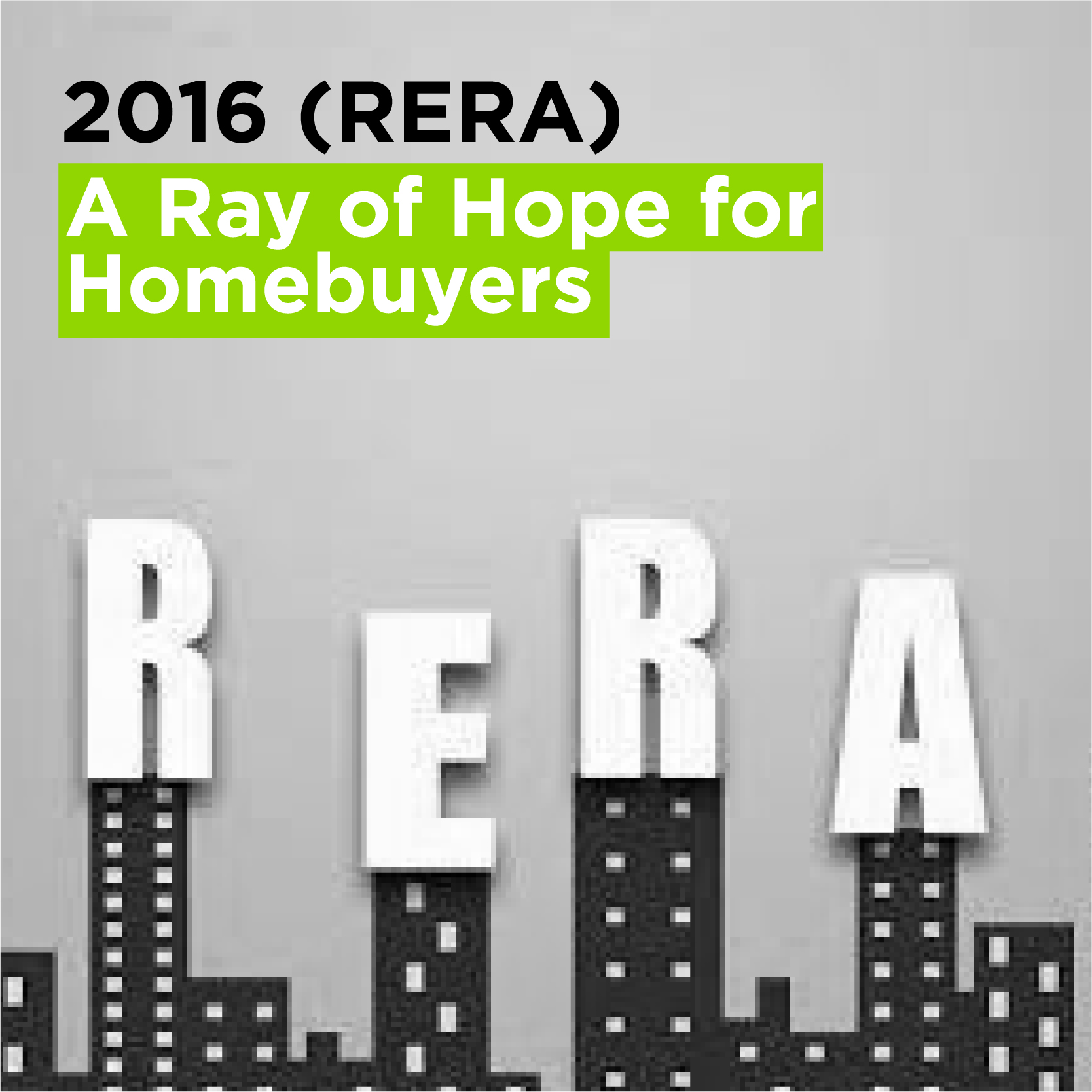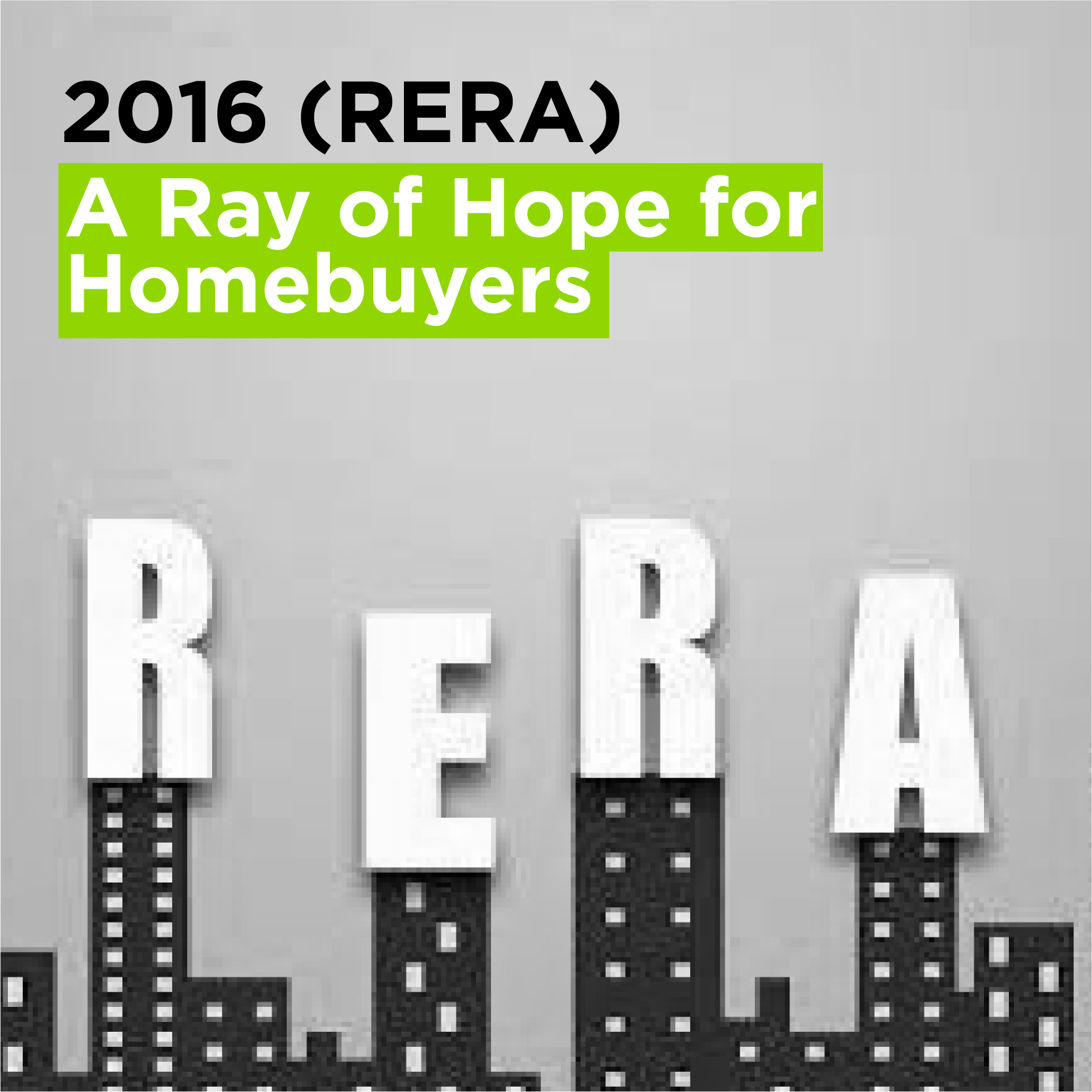The Real Estate (Regulation and Development) Act, 2016 (RERA) – a Ray of Hope for Homebuyers
- RERA stands for Real Estate Regulatory Authority came into existence as per the Real Estate (Regulation and Development) Act, 2016 which aims to protect the home purchasers and also boosts the real estate investments. The bill of this Parliament of India Act was passed on 10 March 2016 by the Upper House (Rajya Sabha). The RERA Act was effective on and from 1 May 2016. At that time, out of 92 sections only 52 were notified. All the other provisions were effective on and from 1 May 2017.
- After agriculture, the real estate sector is the second largest employment generator in India and it is expected to generate over 17 million employment opportunities in near future.
- NITI Aayog expects that the Indian real estate sector will reach a market size of $1 trillion by 2030 and will account for 13 per cent of India’s GDP by 2025.
- The government continues to prioritize the affordable housing segment.
- Everyone from small-time contractors to big corporates like Tatas, Mahindra’s, and Godrej made a foray into Real Estate.
- Despite having a status of a priority sector touching the lives of a large number of homebuyers, the Real estate sector is marred with a large number of acts of omission commission and prolonged and protracted litigation with allottees/buyers.
Home Buyers suffer at the hands of Real estate companies
- Tall and misleading claims /marketing gimmicks
- No value for Commitments
- Poor track record of timely deliveries
- Fund diversions into other projects
- Non-transparent dealings
- A huge departure from approved sanctions/ plans
- Poor quality of construction
- Inordinate delay in completing the projects
- Thrive on litigations
- A large number of players are un-organised.
Hitherto, before the promulgation of RERA, the allottees/ buyers had no option but to go through the long winding litigation in civil courts with no hope of an early settlement of their grievances. In such a scenario, RERA has come as a great relief and a ray of hope for the home buyers.
Objects of RERA
The RERA is intended to achieve the following objectives:
- ensure accountability towards allottees and protect their interest;
- infuse transparency, fair-play and reduce frauds & delays;
- introduce professionalism and standardization;
- imposing responsibilities on both promoter and allottees;
- establish a regulatory oversight mechanism to enforce contracts;
- establish fast- track dispute resolution mechanism;
- promote good governance to create investor confidence

In this article, we will examine some of the important sections of RERA and how they give relief to the allottees/home buyers.
Unit of Sale:
Before RERA there was no uniformity of unit sale of real estate projects, they were sold based on `carpet area’, `built up area’ and `super area’ without indicating what is included and excluded from it and what is the loading factor for common areas. Mostly the allottees end up getting much less than what they were promised and would expect to get.
The Act now clearly defines what is Carpet Area, Built-up area, Super Building area and Common Area and what is included and what is excluded from the definition.
Besides it is made mandatory that in all the documents/advertisement/sales material the unit of sale should be on a `carpet area’ basis only. Even if the builder mentions `built up area’ and `super built-up area; unit price has to be in terms of `carpet area’ only. This will felicitate the allottees to make an informed decision.
Interest:
The interest charged by the builder for delayed payment by the allottees used to be much higher than the interest paid by the Builder to the allottee for delayed completion and delivery of the property booked. It used to be one of the many standard clauses of one-sided builder buyer agreements entered into.
RERA – Section – 2 (z) defines `interest’ and the explanation to this section provides that `the rate of interest chargeable from the allottee by the promoter, in case of default, shall be equal to the rate of interest which the promoter shall be liable to pay to the allottee, in case of default by the Developer’.
Pre-launch sales:
There was a practice of Developers making pre-launch sales without any sanctions in place and without sharing any final firmed up project related information with prospective buyers. When the project is ultimately launched there used to be a gap between what has been promised and what has been delivered.
To address this issue, RERA has provided mandatory prior registration before the sale of a project.
Section 3 of RERA provides that no promoter shall advertise, market, book, sell or offer for sale, or invite persons to purchase in any manner any plot, apartment or building, as the case may be, in any real estate project or part of it, in any planning area, without registering the real estate project with the RERA established under the Act.
Disclosure of complete details of the project for an informed decision:
As per Section 4 of RERA, in the application made for registration of a project the developer has to disclose complete details of the project, details of a project launched in the last 5 years by the company, their stage of completion, delays if any, sanctioned plan, layout plan and specifications of the proposed project, proforma of the allotment letter, agreement for sale and the conveyance deed, names and addresses of the contractors, architect, structural engineer, legal title to the land on which the development is proposed, the land is free from all encumbrances, the period within which the project will be completed. These details are to be updated online in the portal of RERA and Developer Company, by the developer quarterly.
These details will enable the allottees to make an informed decision and track the progress of the project.
Arresting fund diversion:
One of the biggest menaces in the real estate industry is the diversion of the funds collected for one project to other projects being implemented by the Developer Company or purchase of lands, resulting in inordinate delay in completion of Project due to paucity of funds.
Requirement of Maintaining a separate bank account:
To address the issue of fund diversion, RERA provides that 70% of the amounts realized for the real estate project from the allottees, shall be deposited in a separate bank account to be maintained in a scheduled bank to cover the cost of construction and the land cost and shall be used only for that purpose.
Withdrawal from this account is permitted only after it is certified by an Engineer, an Architect and a Chartered Accountant in practice that the withdrawal is in proportion to the percentage of completion of the project.
The promoter shall produce a statement of accounts duly certified and signed verifying that during the audit that the amounts collected for a particular project have been utilized for the project and the withdrawal has been in compliance with the proportion to the percentage of completion of the project.
Revocation of Registration
Under Section 7 of RERA, Registration of the project granted by RERA can be revoked if the RERA is satisfied that
- the promoter made a default in doing anything required under this Act
- the promoter violates any of the terms or conditions of the approval given by the competent authority;
- the promoter is involved in any kind of unfair practice or irregularities
Once registration is revoked all the activities by the Builder will come to a grinding halt.
Accountability of Brokers/Agents:
Under RERA Brokers/Agents must get themselves registered with RERA and
(a) not to facilitate the sale which is not registered with the Authority;
(b) not involve himself in any unfair trade practices, namely:
Adherence to sanctioned plans:
Another important issue which allottees complaint against Developers is the huge unauthorised deviation from sanctioned plan.
Section 14 of RERA address this concern, which provides that:
- The proposed project shall be developed by the promoter as per the sanctioned plans, layout plans and specifications approved
- No alterations or additions in the sanctioned plans, layout plans and specifications of the buildings or the common areas within the project shall be made without the previous written consent of at least two-thirds of the allottees, other than the promoter, who have agreed to take apartments in such building.
Transfer of rights in the project:
Many times, at the pre-construction stage the project is marketed by a reputed Builder then the project is transferred to some other builders without the approval of the allottees.
Section 15 of RERA addresses this issue, which provides,
The promoter shall not transfer or assign his majority rights and liabilities in respect of a real estate project to a third party without obtaining prior written consent
from two-thirds allottees, except the promoter, and of the Authority
Compensation and interest for delay:
Section 18 of RERA provides
• If there is a delay in completion and handing over the project by the Builder, in case the allottee wishes to withdraw from the project, the Builder shall return the amount, with interest at such rate as may be prescribed including compensation in the manner as provided under this Act.
• where an allottee does not intend to withdraw from the project, he shall be paid, by the promoter, interest for every month of delay, till the handing over of the possession, at such rate as may be prescribed.
• The promoter shall compensate the allottees in case of any loss caused to him due to defective title of the land
Handover of the incomplete project to the Association of Allottees:
If there is an inordinate delay on the part of the Developer in completing and delivering the project to the allottees, and the Developer is not in a position to complete the project, on an application, can handover the incomplete project to the Association of Allottees or a contractors/development company/agency to take up the completion of the incomplete the project after they demonstrate their capability to complete the project.
Faster dispute resolution:
Under the RERA regulations every State has set up RERA and RERA Appellate Authority which take up and settle cases in a time-bound manner and the Redressal process by these Authorities is faster than the regular civil courts.
Though a lot is still to be done to improve a lot of allottees of Real estate projects, RERA has succeeded in bringing in
• Transparency
• Accountability
• Arresting fund diversion
• Empowering Allottees
• Fast Redressal of grievances of the allottees
• Instilled disciplines in Real Estate Agents
SimplyBiz Private Limited provides managed services in the field of Advisory, Transactions, Business Setup, Compliance, Accounting and Taxation. SimplyBiz has its Head office in Hyderabad and branch offices in Bengaluru, Chennai, Mumbai and National Capital Region.
SimplyBiz can facilitate
- Advise allottees/association of allottees on RERA-related matters
- File application with RERA and RERA Appellate Authority
- Advice Real Estate companies and represent the company before RERA and RERA Appellate Authority
*The Author S. Prabhakar, is a Fellow member of the Institute of the Company Secretaries of India, Chartered Secretary from UK, Lawyer and Registered Insolvency Professional.
While the author made every attempt to ensure that the information contained in the articles has been obtained from reliable sources, the author or SimplyBiz is not responsible for any errors, omissions or incompleteness. In no event will SimplyBiz, its Partners, Associates or employees be liable to anyone for any decision made or action taken in reliance on the information contained in this article or for any consequential damages.
For enquiries, please reach us at hi@simplybiz.in with your requirements and we shall be happy to help.


Leave A Comment